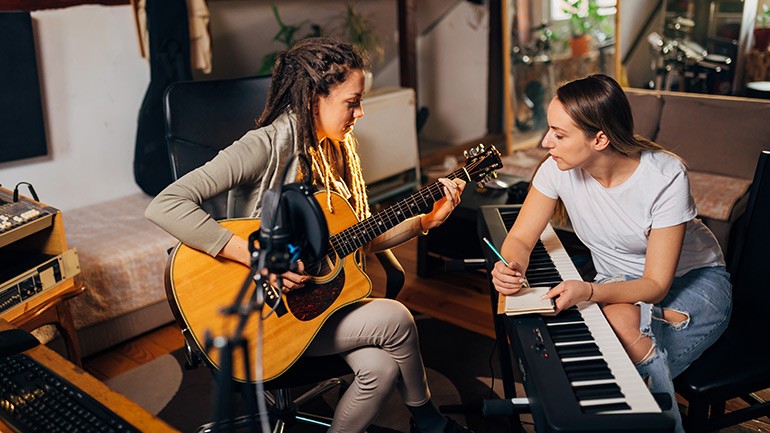Music is often seen as a solitary pursuit, with artists toiling away in their studios, crafting their masterpieces in isolation. While there’s certainly value in solo work, the power of collaboration shouldn’t be underestimated. Connecting and creating with other musicians can open up a world of new possibilities, enriching your musical journey in ways you might never have imagined.
Why Collaborate?
The benefits of collaborating with other musicians are numerous:
- Expanding Your Creative Horizons: Working with different musicians exposes you to new ideas, styles, and perspectives. Their unique approach to music can challenge your own assumptions and push you beyond your comfort zone, leading to unexpected and exciting creative breakthroughs.
- Learning from Others: Every musician has their own strengths and weaknesses. Collaborating allows you to learn from the expertise of others, whether it’s their mastery of a particular instrument, their songwriting skills, or their production techniques. Conversely, you can share your own knowledge and skills, creating a mutually beneficial learning experience.
- Building Your Network: The music industry thrives on connections. Collaborating with other musicians expands your network, opening doors to new opportunities, collaborations, and performances. These connections can be invaluable as you navigate your musical career.
- Gaining Feedback and Support: Sharing your music with others and receiving constructive criticism is essential for growth. Collaborators can provide valuable feedback on your work, helping you identify areas for improvement and refine your craft. They can also offer support and encouragement, especially during challenging times.
- Creating Something Bigger Than Yourself: Sometimes, the magic happens when individual talents combine to create something truly special. Collaboration can lead to the creation of music that’s greater than the sum of its parts, a testament to the power of collective creativity.
- Boosting Motivation and Inspiration: The creative process can sometimes be isolating and demotivating. Working with others can reignite your passion for music, provide fresh inspiration, and keep you motivated to keep creating.
- Having Fun! Making music with friends and fellow musicians is simply enjoyable. Collaboration can bring a sense of camaraderie and shared purpose, making the creative process more fun and rewarding.
How to Find Collaborators:
Finding the right collaborators is key to a successful partnership. Here are some avenues to explore:
- Attend Local Music Events: Go to open mics, concerts, and jam sessions in your area. This is a great way to meet other musicians, hear their work, and connect with like-minded individuals.
- Join Online Music Communities: There are numerous online forums and platforms dedicated to music collaboration. These communities can connect you with musicians from all over the world, allowing you to share your work and find potential collaborators.
- Reach Out to Musicians You Admire: Don’t be afraid to contact musicians whose work you appreciate. Explain why you admire their music and suggest a potential collaboration. You might be surprised at their response.
- Network at Music Schools and Workshops: If you’re attending a music school or workshop, take advantage of the opportunity to connect with other students and instructors. These connections can lead to valuable collaborations.
- Use Social Media: Social media platforms like Instagram, Facebook, and SoundCloud can be great tools for discovering new musicians and connecting with potential collaborators.
Tips for Successful Collaboration:
- Establish Clear Communication: Open and honest communication is crucial for a successful collaboration. Discuss your goals, expectations, and creative vision from the outset.
- Respect Each Other’s Ideas: Be open to different perspectives and be willing to compromise. Even if you don’t always agree, respect each other’s creative input.
- Define Roles and Responsibilities: Clearly define each collaborator’s role and responsibilities to avoid confusion and ensure everyone is contributing effectively.
- Be Flexible and Adaptable: The creative process can be unpredictable. Be prepared to adapt to changes and be flexible in your approach.
- Give and Receive Constructive Criticism: Be willing to give and receive feedback in a constructive and respectful manner. This will help you both grow as musicians and improve the quality of your work.
- Celebrate Successes: Acknowledge and celebrate each other’s contributions and achievements throughout the collaboration process.
Conclusion:
Collaborating with other musicians is a powerful way to expand your creative horizons, learn new skills, build your network, and create something truly special. Embrace the power of community, connect with fellow musicians, and unlock the potential of collective creativity. You might be surprised at the magic you can create together.


